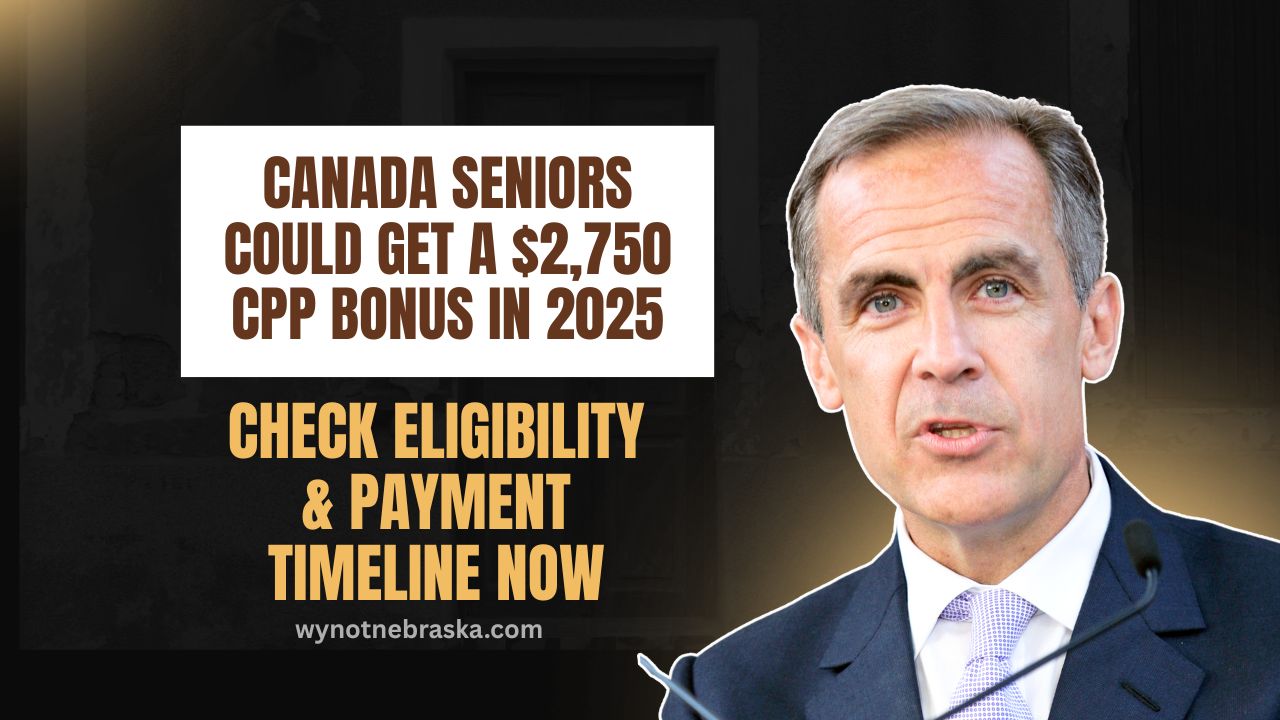As the cost of living continues to rise in 2025, Canadian seniors are looking forward to potential financial relief in the form of a $2,750 CPP bonus.
The Canada Pension Plan (CPP) has undergone key adjustments this year, and the Canada Revenue Agency (CRA) is rolling out targeted support to help aging citizens manage inflation, housing, healthcare, and essential expenses.
Here’s a full breakdown of who qualifies, how the payments are issued, and what seniors should know about this timely benefit.
Eligibility Criteria for the $2,750 CPP Bonus in 2025
To receive the Canada $2,750 CPP Bonus, seniors must meet specific eligibility rules based on their income, residency, and CPP contribution history. The following are the main conditions:
- Must be 60 years or older as of May 2025
- Currently receiving CPP or have contributed to CPP for several years
- Filed a 2024 tax return before the CRA deadline
- Meet low-to-moderate income thresholds as outlined by CRA
- Must be residing in Canada at the time of payment
Those already receiving the Guaranteed Income Supplement (GIS) or who qualify for it may also be prioritized under this initiative.
How and When Will Payments Be Made?
The $2,750 senior benefit payment is anticipated to be distributed between July and September 2025. This gives the CRA enough time to review 2024 tax returns and confirm eligibility.
Most recipients will receive the payment via direct deposit, while those not enrolled may get a mailed cheque—though this may take additional time.
CPP $2,750 Bonus Payment Timeline
| Stage | Details |
|---|---|
| May 2025 | CRA confirms eligibility |
| June 2025 | Notification letters sent |
| July – September 2025 | Payments issued |
| Payment Method | Direct deposit or cheque via mail |
Why This Bonus Matters to Retirees
With inflation driving up prices for housing, groceries, transportation, and prescriptions, many Canadian seniors struggle to keep up, especially those without private pensions.
The CRA retirement boost is a targeted effort to cushion retirees against these rising costs.
The $2,750 CPP bonus is intended as a one-time payment, not a recurring benefit, but it shows how the government is responding to economic pressure on older Canadians. It may also set a precedent for future financial assistance programs.
Other Support Programs for Seniors
In addition to this new bonus, eligible seniors may access several federal and provincial support programs, including:
- Old Age Security (OAS) payments and possible quarterly increases
- Guaranteed Income Supplement (GIS) top-ups
- Housing or utility rebates offered at the provincial level
- Tax credits designed for low-income retirees
Combining these benefits can create a more sustainable financial safety net for seniors in 2025. Seniors should ensure their information is up-to-date with CRA and Service Canada to avoid missing out on any benefits.
Stay Updated: What Seniors Should Do Now
To maximize their chances of receiving the $2,750 CPP bonus, seniors should:
- Verify CRA account details, including direct deposit info
- Ensure 2024 tax returns were filed correctly and on time
- Monitor mail or CRA messages for eligibility confirmation
- Contact CRA or Service Canada if uncertain about qualification
These proactive steps help avoid delays and ensure smooth benefit delivery.
The Canada $2,750 CPP bonus for seniors in 2025 could be a much-needed financial boost for thousands of retirees struggling with day-to-day expenses.
With inflation still weighing heavily on household budgets, this one-time payment reflects a broader governmental effort to protect vulnerable populations and maintain economic stability for older citizens.
Eligible seniors should act now to confirm their status and stay informed about future updates.
FAQs
Is the $2,750 CPP bonus a recurring payment?
No, this is a one-time payment expected in 2025 and not a monthly increase to CPP.
What if I haven’t filed my 2024 taxes yet?
You must file your 2024 tax return on time to qualify for the bonus.
Can seniors outside Canada receive this bonus?
No, recipients must be residing in Canada when the payment is issued.

